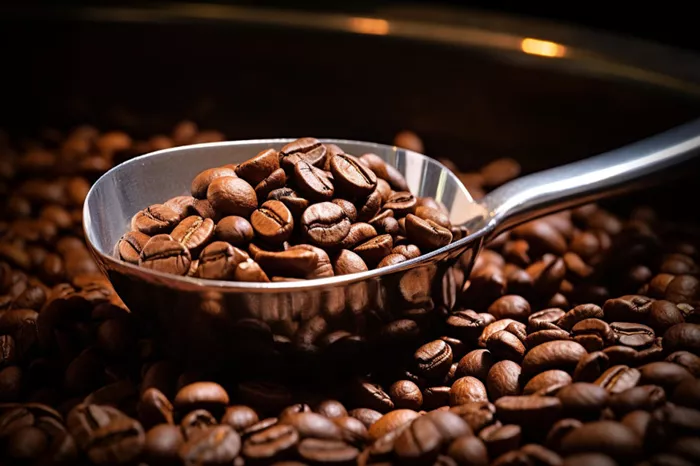Flavored coffee beans have become a staple in many kitchens and cafes. With tempting options like vanilla, hazelnut, and caramel, they promise a rich and unique coffee experience. But are these beans good for your health? Let’s take a deeper look.
What Are Flavored Coffee Beans?
Flavored coffee beans are regular coffee beans that have been coated with flavoring agents after roasting. The process starts with high-quality Arabica or Robusta beans. Once roasted and slightly cooled, these beans are mixed with flavoring compounds.
How Are They Made?
The flavoring process involves:
Natural oils: Extracted from real spices, fruits, or nuts like cinnamon, orange peel, or hazelnuts.
Natural extracts: Derived from plant sources, these offer a more authentic taste.
Artificial flavorings: Chemically engineered compounds that mimic natural flavors.
A small amount of flavoring—usually less than 3% of the bean’s weight—is added to create the desired taste. The beans are tumbled in large mixers to ensure an even coating.
Common Flavors
You’ll often find these popular options:
- Vanilla
- Hazelnut
- Caramel
- Mocha
- Cinnamon
- Pumpkin spice
These flavors make coffee fun and versatile, but there’s more beneath the surface.
Ingredients and Additives
Not all flavored coffee beans are created equal. Some brands prioritize quality and use natural ingredients, while others rely heavily on synthetic compounds.
Typical Ingredients Used
Natural Flavorings: These come from real ingredients and are generally safer and better tasting.
Artificial Flavorings: Made in labs to mimic natural flavors. These are cost-effective but can be controversial.
Added Sugars: Some flavored coffees include sugar, although many beans themselves don’t contain sugar until brewed with a sweetener.
Preservatives and Solvents: Propylene glycol is one example. It’s used as a carrier for flavoring and to keep the flavor stable.
Are Artificial Additives Harmful?
Some health experts express concerns about consuming artificial additives regularly. While FDA-approved flavorings are considered safe in small amounts, overconsumption may cause:
- Allergic reactions
- Digestive discomfort
- Headaches
Propylene glycol, though generally regarded as safe, can be irritating to some people, especially in large quantities.
Health Considerations
So, is flavored coffee a health hazard or a harmless indulgence? The answer depends on the ingredients and how often you drink it.
Calorie Impact
If you drink black flavored coffee made from flavored beans (without milk or sugar), it’s usually low in calories. However, flavored beans with added sugars can increase your calorie intake.
Black flavored coffee: 0–5 calories
Flavored coffee with creamer/syrup: 50–200+ calories per cup
Artificial Ingredients and Health
Research on artificial flavorings is still evolving. Some lab-made compounds have been linked to health issues in animal studies, but these results don’t always apply to humans.
Still, high levels of synthetic additives and preservatives may increase the risk of:
- Inflammation
- Hormonal disruption
- Long-term toxicity
Caffeine Content
Flavored coffee beans have the same caffeine content as regular beans, unless labeled as decaf. That’s typically 95 mg of caffeine per 8 oz cup for Arabica beans.
Benefits of Flavored Coffee Beans
Flavored coffee beans aren’t all bad. For many, they offer a simple pleasure.
Variety and Convenience
Flavored coffee beans provide a wide range of taste options without needing syrups or creamers. This convenience appeals to busy coffee lovers.
Enhanced Experience
A hint of caramel or vanilla can enhance your coffee routine, especially if you’re trying to cut back on sugary add-ins.
Moderation and Balance
Like most things in life, flavored coffee is best enjoyed in moderation.
Tips for Healthier Choices
Choose Natural Flavors: Look for beans flavored with essential oils or natural extracts.
Read Labels: Avoid products with added sugars and long chemical names.
Limit Frequency: Don’t drink flavored coffee exclusively. Mix it up with plain black coffee.
Stay Informed: Research brands to see how transparent they are about their ingredients.
Consumer Preferences
Trends show a growing demand for cleaner, more natural food and beverage options—including coffee.
Natural vs Artificial
More consumers are seeking:
- Organic coffee
- Non-GMO ingredients
- No added preservatives or artificial flavorings
- Brands are responding by offering “clean label” flavored coffee options.
Label Reading Advice
When shopping, consider the following:
Does the label say “natural flavors” or “artificial flavors”?
Are any preservatives listed?
Does it include sugar or sweeteners?
Transparency is key. The more a brand tells you about what’s inside, the better your choice can be.
Brewing Methods
How you brew your flavored coffee can also affect the taste and health profile.
Recommended Brewing Techniques
Cold Brew: Reduces acidity and brings out sweeter notes.
French Press: Offers a fuller body and rich mouthfeel.
Pour Over: Brings out subtle flavors while minimizing bitterness.
Drip Machine: Consistent and convenient, but use filtered water for best results.
Avoid using flavored beans in espresso machines unless specified safe by the manufacturer. The oils can clog the machine.
Conclusion
So, are flavored coffee beans bad for you? Not necessarily.
Flavored coffee beans can be a delicious addition to your routine—if you choose wisely. Go for natural flavorings, avoid added sugars, and keep an eye on preservatives. Most importantly, enjoy them in moderation.
When sourced responsibly and consumed in balance, flavored coffee can add variety and delight to your daily brew without sacrificing your health.
Enjoy your cup, stay informed, and brew smart.
Related topics:
- What Is a Manual Espresso Machine?
- Who Supplies Starbucks Coffee Beans
- Mocha Cream Cold Brew: A Delicious Fusion of Coffee, Chocolate, and Cream


